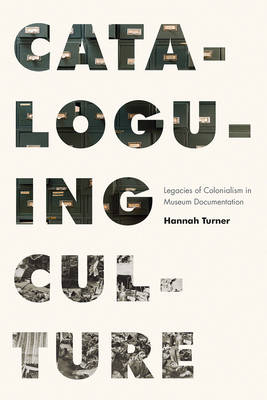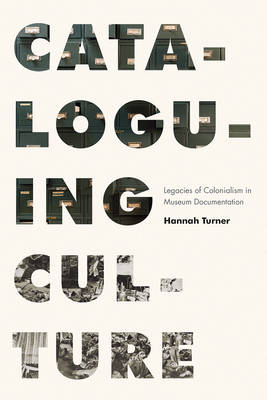
Bedankt voor het vertrouwen het afgelopen jaar! Om jou te bedanken bieden we GRATIS verzending (in België) aan op alles gedurende de hele maand januari.
- Afhalen na 1 uur in een winkel met voorraad
- Gratis thuislevering in België
- Ruim aanbod met 7 miljoen producten
Bedankt voor het vertrouwen het afgelopen jaar! Om jou te bedanken bieden we GRATIS verzending (in België) aan op alles gedurende de hele maand januari.
- Afhalen na 1 uur in een winkel met voorraad
- Gratis thuislevering in België
- Ruim aanbod met 7 miljoen producten
Zoeken
Cataloguing Culture
Legacies of Colonialism in Museum Documentation
Hannah Turner
Hardcover | Engels
€ 100,95
+ 201 punten
Uitvoering
Omschrijving
How does material culture become data? Why does this matter, and for whom? As the cultures of indigenous peoples in North America were mined for scientific knowledge, years of organizing, classifying, and cataloging hardened into accepted categories, naming conventions, and tribal affiliations--much of it wrong. Cataloguing Culture examines how colonialism operates in museum bureaucracies. Using the Smithsonian's National Museum of Natural History as her reference, Hannah Turner organizes her study by the technologies framing museum work over 200 years: field records, the ledger, the card catalog, the punch card, and eventually the database. She examines how categories were applied to ethnographic material culture and became routine throughout federal collecting institutions. As indigenous communities encounter the documentary traces of imperialism while attempting to reclaim what is theirs, this timely work shines a light on the ongoing colonization of this cultural heritage in the archive.
Specificaties
Betrokkenen
- Auteur(s):
- Uitgeverij:
Inhoud
- Aantal bladzijden:
- 256
- Taal:
- Engels
Eigenschappen
- Productcode (EAN):
- 9780774863926
- Verschijningsdatum:
- 1/08/2020
- Uitvoering:
- Hardcover
- Formaat:
- Genaaid
- Afmetingen:
- 152 mm x 229 mm
- Gewicht:
- 518 g

Alleen bij Standaard Boekhandel
+ 201 punten op je klantenkaart van Standaard Boekhandel
Beoordelingen
We publiceren alleen reviews die voldoen aan de voorwaarden voor reviews. Bekijk onze voorwaarden voor reviews.












